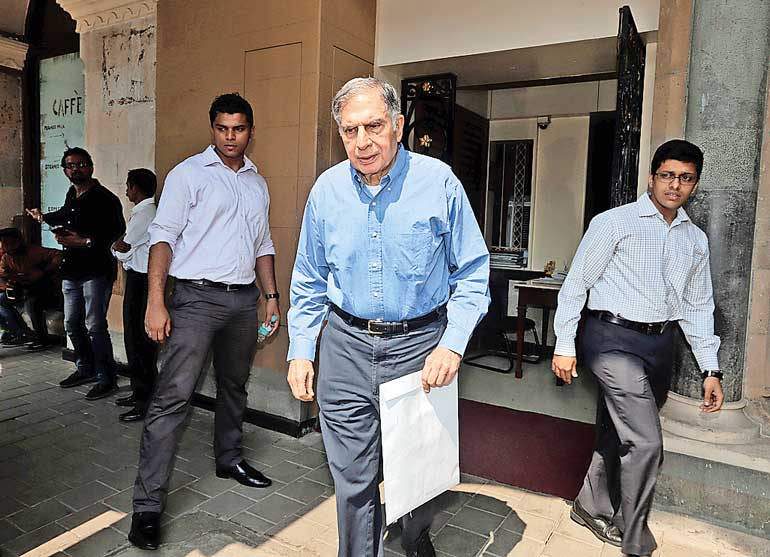Sunday Feb 22, 2026
Sunday Feb 22, 2026
Monday, 31 October 2016 00:01 - - {{hitsCtrl.values.hits}}
 Ratan Tata, interim chairman of India’s Tata group, leaves his office building in Mumbai, India October 27, 2016. REUTERS
Ratan Tata, interim chairman of India’s Tata group, leaves his office building in Mumbai, India October 27, 2016. REUTERS
Reuters: Ratan Tata may have dumped Cyrus Mistry as chairman of his 148-year-old family empire, but will find it harder to expunge the ex-manager’s accusations that his acquisitive habits and lack of focus on returns have destroyed billions of dollars in shareholder value.
Tata Sons has rejected as baseless and malicious the allegations that Mistry, 48, laid out in a 5-page letter to the board accusing Ratan Tata of backseat driving while in retirement and of thwarting his drive to restructure and refocus the $104 billion Indian conglomerate.
Tata has launched a four-month search for a new chairman, and whoever lands the job will inevitably face the same challenges that Mistry felt he was unable to tackle because, he alleged, he lacked the backing of a board that he said answered only to Ratan Tata.
“What was 10-15 years ago - a Tata group that was a paternalistic conglomerate with more than 100 companies just ambling along - no longer works,” said Shriram Subramanian of InGovern, a shareholder advocacy group.
“Shareholders need reassurance that the Tata operating companies are really working to enhance shareholder value rather than acting on the whim of one individual.”
The incoming chair also faces possible regulatory probes after Mistry alleged a total breakdown in corporate governance, and said a “realistic assessment” of the group’s portfolio would require $18 billion in writedowns.
Hanging around
Mistry, fired as Tata Sons chairman on Monday, remains a director as well as chairing listed subsidiaries Tata Motors, Tata Steel and Tata Consultancy Services.
Should he refuse to go quietly, any attempt to oust him after his acrimonious split with the 78-year-old patriarch risks becoming messy. Further, Mistry’s Pallonji family owns nearly a fifth of Tata Sons, while Tata family trusts control a two-thirds stake.
“This saga has not gone well and isn’t good news in relation to the long-term strategic direction of the group,” said a manager at a large Mumbai-based institutional investor that owns shares in some Tata group companies. “It doesn’t affect the near-term operations of the companies, but strategically, in the long run, companies get impacted.”
A person close to the Tatas warned that “the fight has just started”, while recognising that Mistry had inherited all of the group’s legacy issues, from steel to telecoms, and could have done little to rectify them.
Outside investors can only own shares in Tata’s listed units. Lacking influence over strategy at group level, they have reacted to the bust-up by voting with their feet, erasing an estimated $4 billion from their combined market value this week.
Balancing act
While the battle between Mistry and Tata plays out in public, and perhaps even the courts, the company is launching a search for a worthy successor.
On Tuesday, Tata named N. Chandrashekharan, CEO of TCS, and Ralf Speth, CEO of Tata Motors’ luxury car arm, Jaguar Land Rover, as directors to the Tata Sons board, fuelling speculation that one or both are frontrunners.
Whoever takes the top job must work with a board that has both a duty to protect not just the interests of its shareholders, but is also committed to other stakeholders in a group that employs 660,000 people and has accounted for 8 percent of the Bombay Stock Exchange’s market capitalisation.
The crux of the Tata world view, said Morgen Witzel, a UK-based business historian and author of a book on the Tata company, is that shareholder value should not be an end in itself.
“Companies are not machines for making money. They exist to provide value and service to their communities; profit is a by-product of that process,” he said.
To his credit, Mistry had made headway in his bid to change Tata’s slow and bureaucratic way of working, and turn it into a younger, more agile and inclusive organisation by tearing down the barriers of hierarchy.
“Ratan was about growth and turnaround, Cyrus believed you could only do that to a certain level but then you have a responsibility to grow returns for your shareholders for which you have to cut debt and be nimble,” said another person close to the company, adding that this jarred with the Tata ethos.
Suresh Raina, managing partner at executive search firm Hunt Partners, noted the Tata Sons board focuses on strategy and not operations, and worries little about quarterly profits.
“That’s where the values become central to how the board operates,” Raina said. “How the candidate aligns with these tenets and criteria will be more important than the business imperatives.”